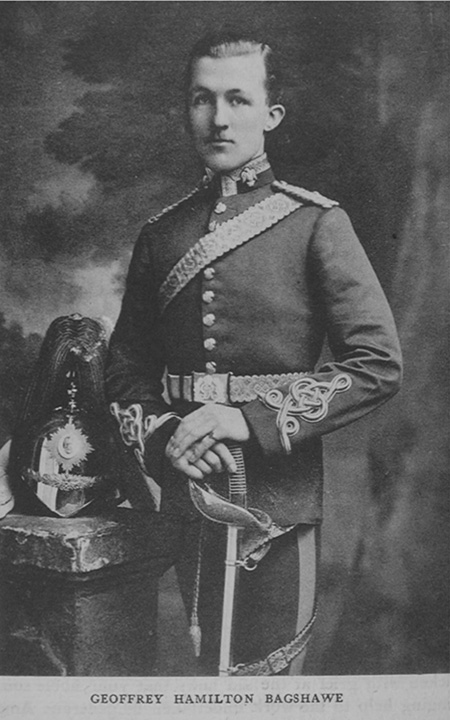Killed in action aged 25
No known grave
Geoffrey Hamilton was born at Westfield, Poynton, Cheshire, elder son of Ernest and Alice Bagshawe of Ford Hall, Chapel-en-le-Frith, and Poise House, Hazel Grove.
(His father, a cotton spinner and manufacturer, was born Ernest Carver, the grandson of the founder of Hollins Mill Company, and the son of Thomas Carver, a well-known Manchester philanthropist. Alice was the daughter of W G Greaves-Bagshaw, when he died in 1914 she inherited Ford Hall, and Ernest, Alice and their children changed their surname, by deed poll, to Bagshawe.)
Geoffrey was educated at Harrow (where he was known as Carver) and Christ Church 1907-11 and then obtained a commission in the 1st Dragoons, serving as a 2nd Lieutenant in South Africa. When the Regiment returned to Britain in 1913 he left the army and went to farm in Rhodesia. On the declaration of War in August 1914 he immediately returned and rejoined his unit, going to France the following month. On 11 November Geoffrey was wounded in the leg by shrapnel and invalided home to recover. He rejoined his regiment, in the Ypres salient, only a few weeks before he was killed. Fighting around Ypres had been intense since 22 April, when the Germans launched a massive assault, involving the use of poison gas for the first time in history. Casualties had been so heavy that the cavalry was pressed into action to serve in the trenches as infantry.
 On 13 May Geoffrey’s unit was in the support trenches, just behind the front line, north of Bellewaarde Lake, near Hooge (a couple of kilometres from the town centre). At 4am an intense German bombardment rained down on their positions, causing many casualties. Three hours later, they received orders to immediately move forward down the trench system to support the 3rd Dragoons, who were reported to have been forced to withdraw from the front line by an enemy infantry attack. When they arrived, they learnt the information was wrong and they started to make their way back to their original positions. Once again, they were caught by another barrage of shells and further casualties were suffered. More than 20 men were killed that day, and about 150 wounded.
On 13 May Geoffrey’s unit was in the support trenches, just behind the front line, north of Bellewaarde Lake, near Hooge (a couple of kilometres from the town centre). At 4am an intense German bombardment rained down on their positions, causing many casualties. Three hours later, they received orders to immediately move forward down the trench system to support the 3rd Dragoons, who were reported to have been forced to withdraw from the front line by an enemy infantry attack. When they arrived, they learnt the information was wrong and they started to make their way back to their original positions. Once again, they were caught by another barrage of shells and further casualties were suffered. More than 20 men were killed that day, and about 150 wounded.
The news of Geoffrey’s death came to Hazel Grove police station by telegram on 16 May. His family was in London at the time, so the news was received by their gardener. A letter in Geoffrey’s service file from the War Office says that he had been buried “in the open near the road south of Square i.11.b, Map Sheet 28”.
An examination of a trench map of the time suggests this is about 4 kilometres east of the town of Ypres and must be near the road which ran down the western side of “Railway Wood”. In the years of fighting that followed, the location of his grave was lost, and he is now commemorated on Panel 5 of the Memorial to the Missing at the Menin Gate.
A senior Officer of his Regiment wrote to his father: —
"In your son we have lost as good a troop leader as there ever was in the Regiment, absolutely cool and undisturbed under the most trying circumstances, knowing not the meaning of the word fear; well loved and rightly, highly esteemed and deeply regretted by Officers and all ranks of the Regiment. He has died a gallant death, in a good and just cause — and I can only say I most deeply regret him as a friend and as an invaluable officer. We, alas, lost heavily in the Regiment — out of 340 all ranks, there remained this morning, I believe, 180. The General told me tonight they fought right gallantly and that is the only point we can be thankful for. May we in our turn do as well."
His Major wrote : — " We have all lost a dear comrade."
It is thought Geoffrey did not leave a Will as his father was granted administration of the estate @ £712 4s 7d. His estate included £260.2.8d (deposited with Messrs Cox & Co) and £427.1.11d (with the Standard Bank of South Africa), the total being worth over £35,000 at 2010 values.
Further information about Geoffrey, including a photograph, can be found in the books “Hazel Grove to Armageddon” by John Eaton and “Remembered” by P Clarke, A Cook and J Bintliff.

